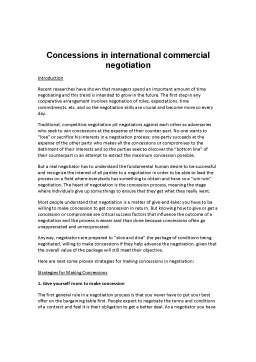Extras din referat
Introduction
Recent researches have shown that managers spend an important amount of time negotiating and this trend is intended to grow in the future. The first step in any cooperative arrangement involves negotiation of roles, expectations, time commitments, etc. and so the negotiation skills are crucial and become more so every day.
Traditional, competitive negotiation pit negotiators against each other as adversaries who seek to win concessions at the expense of their counter-part. No one wants to “lose” or sacrifice his interests in a negotiation process; one party succeeds at the expense of the other party who makes all the concessions or compromises to the detriment of their interests and so the parties seek to discover the “bottom line” of their counterpart in an attempt to extract the maximum concession possible.
But a real negotiator has to understand the fundamental human desire to be successful and recognize the interest of all parties to a negotiation in order to be able to lead the process on a field where everybody has something to obtain and have so a “win-win” negotiation. The heart of negotiation is the concession process, meaning the stage where individuals give up some things to ensure that they get what they really want.
Most people understand that negotiation is a matter of give-and-take: you have to be willing to make concession to get concession in return. But knowing how to give or get a concession or compromise are critical success factors that influence the outcome of a negotiation and the process is easier said than done because concessions often go unappreciated and unreciprocated.
Anyway, negotiators are prepared to “slice and dice” the package of conditions being negotiated, willing to make concessions if they help advance the negotiation, given that the overall value of the package will still meet their objective.
Here are next some proven strategies for making concessions in negotiation:
Strategies for Making Concessions
1. Give yourself room to make concession
The first general rule in a negotiation process is that you never have to put your best offer on the bargaining table first. People expect to negotiate the terms and conditions of a contract and feel it is their obligation to get a better deal. As a negotiator you have to be prepared with several items that you will be willing to take off the table in response to concession demands and you will ask in return.
2. Determine all demand before making concessions
A smart psychology for the negotiators is to roll out their concession demands over time. They expect to say “Well in the scope of things, this is really no big deal.” when they make a string of small stand-alone demands. Then around the third or fourth request, they figure you’ll start catch on and they hope you feel too invested to back down or change the rules and they present two or more concession demands to close the deal. After the contract is signed and the concessions request are totaled, it become startlingly apparent how their strategy has eroded your bottom-line profit.
To eliminate this from happening to you, respond to the very first concession demand by asking: “In addition to …, is there anything else that is important to you? “, because with a complete list of concessions in hand, you have a better position to protect your company’s interest and develop a range of viable options for your counter-part.
3. Don’t make the first concession on a major item
When you make a concession on a major item, your counter-part may think that it was too easy and he can get something more. So, if you refuse to make a concession on a major item, he receives the message that you place a high value on that item and this works in your favor. Your reluctance lowers the other party’s expectations of what he thinks can be obtained.
4. Give away what’s not important to you but of importance to the other party
Weak negotiators can’t define what they need and want before entering into a negotiation. So they can give in to a concession demands and then wish they hadn’t. to avoid this, you have to determine in advance what you need from the negotiation, this being the walk-away point. Then determine what you want. This will determine what you will give and not give away in responsible to concession request.
While it is difficult to be prepared for every possible concession demand, having a list of possibilities will help you to remain clear minded and deliberate in how you respond to request – even unexpected ones. This will eliminate the possibility for you to become flustered and make concessions that you wish you hadn’t.
Preview document
Conținut arhivă zip
- Concessions in International Commercial Negotiation.doc






